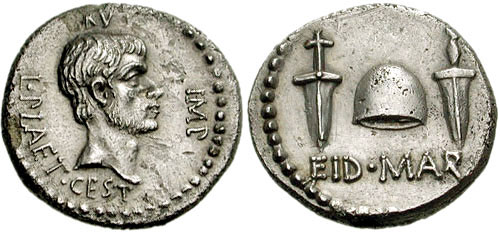March 15, 2017, by Will Leveritt
Beware the Ides of March
Text by Juliet O’Brien
On this day in 44 BC the Roman dictator Julius Caesar was assassinated at a meeting of the senate.
Caesar had first briefly held the dictatorship in early 49. After defeating his great political rival Pompey the Great at Pharsalus in 48 he held that position again in 48 and 47, and was subsequently appointed dictator for ten years in 46.

The famous “Ides of March” denarius. Oberse has L. PLAET. CEST BRVT IMP and head of Brutus r., reverse has a liberty cap flanked by daggers, and EID MAR. Image courtesy Classical Numismatic Group, Inc.
During this period he defeated the remnants of the resistance to him, but frequently showed mercy to his enemies, pardoning them for having stood against him.
With his position at last secured, he was proclaimed dictator perpetuo (dictator for life) in January 44.
Caesar was very popular with the ordinary citizens of Rome, having courted them at all stages of his political career. His conquest of Gaul and his campaigns in Britain in the 50s had also earned him their approval. Consequently, the urban populace mourned his death.
Yet his acquisition of sole power was by no means universally popular. Indeed, there was particular resentment amongst conservative senators who believed that Caesar had destroyed the Republic.
His appropriation of unmatched power and honours had placed him far above his fellow aristocrats, who held firmly to the belief that the Republic was, and should be, based upon open competition for offices and honours between social and political equals. Consequently, his show of mercy to his defeated enemies appeared to them to be a show of arrogance, and the mark of a tyrant.
Caesar compounded this impression with what was arguably an unforced error in February 44. At the festival of the Lupercalia, Caesar’s closest ally Mark Antony had attempted to place a diadem upon his head. This appeared to be a bid for kingship, and drew jeers from the crowd.
Despite the growing resentment against him, Caesar ignored his friends’ pleas to employ a bodyguard. This attitude reflected his confidence in his political power and a personal preference not to spend his life dreading death but rather to meet a swift end.
A plot to murder Caesar was hatched by a group of senators, led by Marcus Brutus and Gaius Cassius, who were committed to, as they saw it, killing a tyrant and restoring Republican liberty.
A meeting of the senate was due to take place on 15 March, 44. The venue was the Temple of Venus, a building attached to the grand theatre complex built by Pompey in 55.
Caesar had received warnings of his impending death, but ignored them. The soothsayer Spurinna foresaw danger in a sacrifice Caesar had made and told him to be wary of the Ides of March (the 15th). But on the day Caesar chided him that the Ides had arrived and all was well. Spurinna quipped that they had arrived, but were not yet over. And earlier his wife Calpurnia had had a nightmare about his death.
Moreover, Caesar had been passed a note warning him about the plot, but had placed it among his other papers, intending to read it later. He went on to the senate meeting. Mark Antony attempted to do the same, but was deliberately waylaid by one of the conspirators so that he would not be able to come to Caesar’s aid.
At the meeting, one of the conspirators, Lucius Tillius Cimber, approached Caesar as if to present a petition, then grabbed his toga and pulled it down. Caesar exclaimed ‘truly this is violence!’ At that point, another conspirator, Casca, stabbed Caesar in the throat. Caesar attempted to defend himself with his stylus, but in vain. The other assassins began their attack.
Caesar, hemmed in by assassins, covered his face with his toga, seemingly resigned to his fate. It is said that he was stabbed 23 times, with each assassin landing at least one blow. Caesar died beneath the statue of his old rival, Pompey.
After the death, an amnesty was declared for the killers. However, Mark Antony whipped the crowd into a frenzy at Caesar’s funeral by displaying the brutalized corpse during his funeral oration. Caesar had also left 300 sestertii to each citizen in his will, further increasing popular grief and anger at his death.
The result was that the conspirators fled Rome. A civil war ensued between them and the Caesarians (led by Mark Antony and Caesar’s great-nephew and adopted son, Octavian, the future emperor Augustus). The Caesarians would eventually defeat Brutus and Cassius in 42 at the Battle of Philippi.
No comments yet, fill out a comment to be the first

Leave a Reply